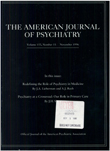Effect of imipramine on mood and enumerative measures of immune status in depressed patients with HIV illness
Abstract
OBJECTIVE: The authors' first objective was to ascertain whether imipramine is superior to placebo in treating axis I depressive disorders in the context of HIV illness. Supplementary questions were whether severity of immunodeficiency is associated with antidepressant response and whether patients with greater immunodeficiency can tolerate standard doses of imipramine. Second, the authors sought to determine whether imipramine treatment is associated with changes in immune status. METHOD: A double-blind, randomized placebo-controlled trial of imipramine was conducted in a university-affiliated research outpatient clinic. After 6 weeks of treatment, responders were maintained double-blind for another 6 weeks and nonresponders were removed from the study and treated openly. All patients were offered 26 weeks of treatment. Of the 97 patients who were randomly assigned to placebo or imipramine, 80 completed the 6-week phase. Main outcome measures included the Clinical Global Impression, the Hamilton Depression Rating Scale, the Brief Symptom Inventory, and CD4 cell count. RESULTS: Among study completers, 31 (39%) had AIDS. The response rate to imipramine was 74% and the response rate to placebo was 26%. There was no difference in depression response between patients with more or less severe immunodeficiency, nor was there a difference in medication dose or side effects. Neither type nor duration of treatment influenced CD4 cell count during the course of treatment. CONCLUSIONS: Depressed patients with HIV illness respond to imipramine at the same rate as medically healthy depressed patients. Severity of immunosuppression is not associated with imipramine treatment outcome. There is no evidence that imipramine has negative effects on enumerative measures of immune status.
Access content
To read the fulltext, please use one of the options below to sign in or purchase access.- Personal login
- Institutional Login
- Sign in via OpenAthens
- Register for access
-
Please login/register if you wish to pair your device and check access availability.
Not a subscriber?
PsychiatryOnline subscription options offer access to the DSM-5 library, books, journals, CME, and patient resources. This all-in-one virtual library provides psychiatrists and mental health professionals with key resources for diagnosis, treatment, research, and professional development.
Need more help? PsychiatryOnline Customer Service may be reached by emailing [email protected] or by calling 800-368-5777 (in the U.S.) or 703-907-7322 (outside the U.S.).



